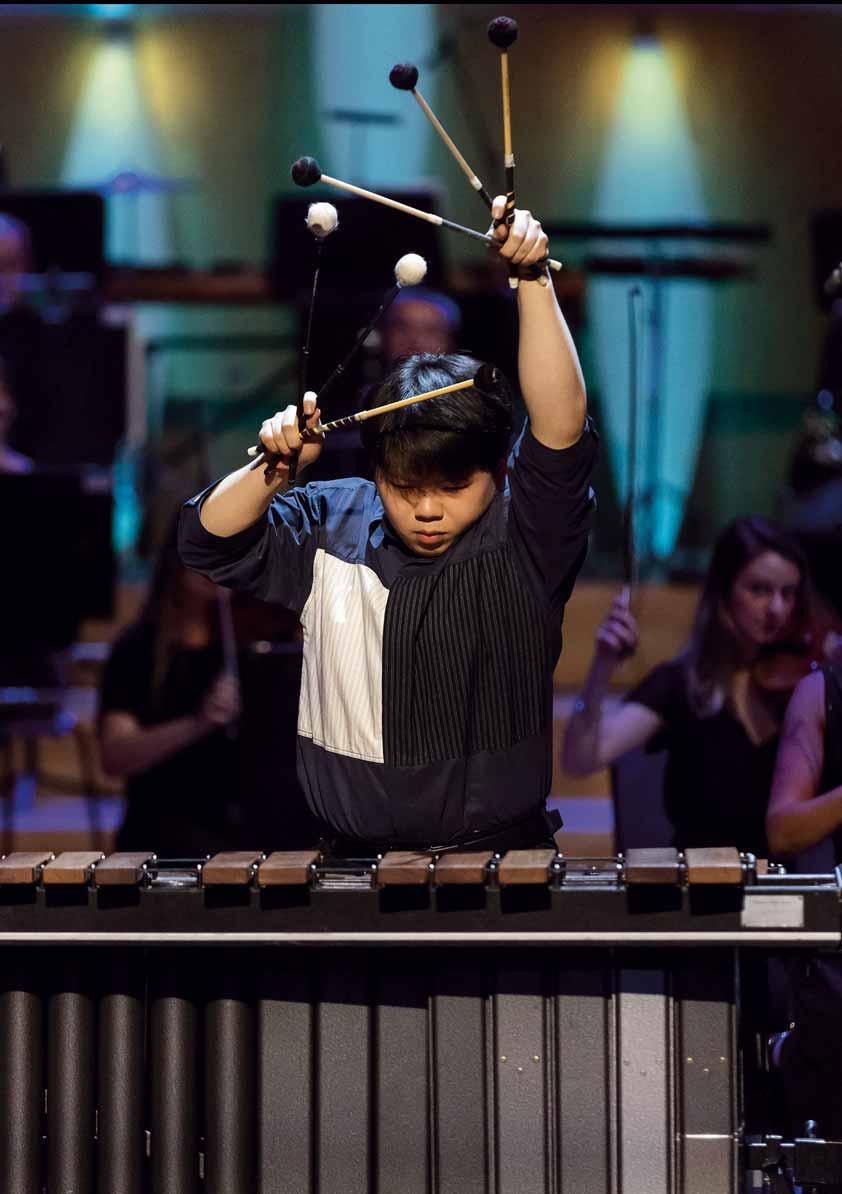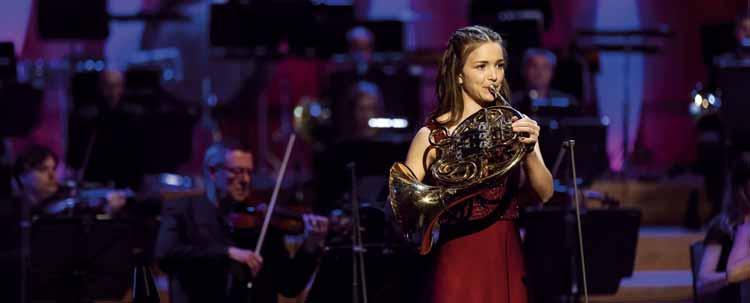
9 minute read
BBC Young Musician 2020
Percussionist Fang Zhang is the latest winner of the BBC Young Musician competition. Clare Stevens reports on the three finalists’ long journey to the emotional conclusion of the 2020 event
Left: Fang Zhang Photo: Fabio di Paola / PA Wire The category finals of BBC Young Musician 2020 proceeded at the Royal Welsh College of Music and Drama (RWCMD) in Cardiff very much as usual. The 25 competitors presented the specialist juries with the difficult task of assessing performers of remarkable ability, looking for the five young musicians who demonstrated the most impressive combinations of technical skill, musical understanding and that very special star quality that nobody can quite define. After some intense discussions in the jury room, one by one the category winners emerged: 18-year-old French horn player Annemarie Federle (Brass); 19-year-old violinist Coco Tomita (Strings); 18-year-old oboist Ewan Millar (Wind); 17-year-old Fang Zhang (Percussion); and 17-year-old Thomas Luke (Piano).
In late March 2020 the five young musicians went on to repeat their recital programmes in the semifinal, in front of an enthusiastic audience. Jury chair Angela Dixon, chief executive of Saffron Hall concert hall in Suffolk, announced that ‘in no particular order’ the three players going through to the Grand Final were Ewan Millar, Annemarie Federle and Fang Zhang, telling the TV presenters later that ‘music, music and music got them through – their musicianship, their commitment to the music and their performance’.
And then … everything stopped. The Grand Final should have taken place in the Bridgewater Hall, Manchester, in May 2020, with the three competitors playing concertos with the BBC Philharmonic Orchestra, conducted by Mark Wigglesworth; but like everything else it fell victim to the pandemic. The BBC decided not to broadcast the semi-final until they could do so in tandem with the concerto final, so the trio could not even reveal to anyone other than immediate family and their teachers that they had got through.
Worse, they had absolutely no idea when they would be performing in the last stage of the competition. Possible dates were pencilled into diaries and rubbed out again as lockdowns came and went. Zhang, a pupil at Chetham’s School in Manchester, went home to his family in China. In September Federle began her first year at the Royal Academy of Music, in circumstances very different from normal; Millar began the second year of his music degree at Oxford University, shoe-horning his studies around oboe practice in a way that he had never intended.
Fast forward to 25 April 2021, and Federle finally took her place in front of a distanced BBC Philharmonic to perform the Horn Concerto Op 58 by Ruth Gipps in a Grand Final that had been delayed by almost a year. For oboist Nicholas Daniel, who in 1980 was the second winner of the competition and this year was a commentator on the final, it was ‘completely shocking to see those three incredible young musicians walk out onto that extended stage in an empty hall, with the judges so close and no audience other than the presenters and the cameras. It looked like a concert when we watched it later on television, but it really didn’t feel like it for those of us who were there … until they started to play. Then you could feel their performance instincts kick in.’ Asked how it felt to be in that position, and whether she was able to enjoy the performance in those strange circumstances, Federle says that she definitely did. ‘For the past year I’ve been doing very little performing, but I have done a few recitals without audience, so in some ways that made it easier. In the previous rounds the jury was lit up, so we were very aware of them, and the final didn’t feel that different. We were encouraged to treat the orchestra as the audience, to bow to them afterwards, which helped. It was the first time I’d played the piece with an orchestra, so I really enjoyed that aspect of it, especially working with them in the rehearsals and all the musical interaction between the soloist and the wind principals.’
Both the French horn and the oboe are notoriously difficult instruments technically, and the jurors and the broadcast presenters were all in awe of Federle’s and Millar’s ability to deliver spinetingling, technically flawless performances in such a situation. But in the end it was Fang Zhang, playing Japanese composer Keiko Abe’s solo marimba piece ‘Prism Rhapsody’ in an arrangement with orchestra by Iain Farrington,

Above: French horn player Annemarie Federle Photo: Fabio di Paola / PA Wire who produced that extra special magic that earned him the title.
‘They were all incredibly assured and confident, but something indefinable happened when Fang was playing,’ says Dixon. ‘He was absolutely laser-focused and had complete command of his instrument, which he played with incredible dexterity, but at the same time he managed to connect with the conductor, the orchestra and with us in a very charming way. He drew so much out of his marimba, and evoked a very emotional response from everyone in the room. People were looking at each other afterwards, stunned – gasping and crying. I wondered how much of the atmosphere he created would come across on television, but evidently it did.’
Fang Zhang had been studying at Chetham’s since September 2018 when he entered the competition. He is a member of China Youth Percussion Orchestra, with which he has been performing around the world since he was 11 years old. Among his tutors are international percussion luminaries such as Royal Northern College of Music Deputy Director of Percussion Le Yu, and Chen ShaoLun, president of the Shanghai National Percussion Association. He has already won prizes at international percussion competitions in the USA, Japan, and his native China.
‘I am honoured and delighted to win BBC Young Musician 2020, and feel so lucky considering the talent of the other finalists,’ he says. ‘The BBC team is amazing, and I want to thank them and my schools, Chetham’s School of Music and Qingdao Percussion College, for supporting me through the whole programme in every possible way.’
Zhang is only the second percussionist to win the competition since the category was introduced in 1994, following Adrian Spillett in 1998. Previous percussion finalists have tended to perform concertos that used the whole array of tuned and untuned instruments available to them, often testing their fitness as well as their musicianship as they sprint from drum kit to tubular bells to vibraphone, bongos, glockenspiel, gong or temple bells. It was a testament to his confidence, says Dixon, that Zhang chose to perform only on the marimba. She feels he benefited from confounding expectations and opting for a relatively unshowy piece that simply demonstrated his skill on one instrument and his innate musicality. ‘He elicited a kaleidoscope of colours and expression from it that deeply moved the jury and presenters,’ she says. ‘It was a privilege to be one of the few people to hear his performance live.’
Nicholas Daniel says ‘The achievement for all three finalists to perform so brilliantly in this particular year is something that cannot be overstated. One reason why young people play so well in this competition in normal years is that it’s a culmination of many rounds, with an end goal. This year nobody knew when or indeed if that end goal was going to happen. Annemarie, Ewan and Fang have spent a year at home since the pandemic started and their previous round ended, working on Zoom, perhaps with some faceto-face lessons involving much stress, distancing, travel and thought … the massive effort required to get them to the level of playing we heard in the hall is something I will never forget.’
Conductor Mark Wigglesworth was perhaps the person best placed on the day to assess the professionalism as well as the musicianship of the three performers. ‘BBC Young Musician is always a glorious celebration of the future, but especially this year, it offered a much needed sense of optimism to everyone in the classical music world,’ says Wigglesworth. ‘All three finalists showed a tremendous passion and determination to maintain their commitment to the competition across a year of
uncertain silence. They play with humility and respect, but daring and personality too, encouraging all who hear them to look forward to more positive times ahead.’
The competition has given Federle and Millar the experience of a hugely high-pressure performing environment and public showcase, with the added benefit, as Daniel points out, of not winning, so they can complete their education away from the spotlight and build their future careers at their own pace.
Millar feels this is a good thing, as he is still undecided about his future path. ‘I’ve been told by my musical heroes that being in the final is the thing that puts you on the threshold of the profession, not whether you win or not. I realise that as a result of this exposure I may be in a position to help expand the repertoire and inspire more people to play the oboe, and these are very noble aims, but I can’t immediately capitalise on it. I want to get the formal qualifications and consolidate my technique before I do too many public performances; I don’t want to be too presumptuous about my own ability, I want to take my time, and then if people still remember me in a few years’ time, that will be great.’
Angela Dixon said: ‘Each of the three finalists was fantastic in a different way, and each of them really could have won it. Annemarie had such poise; the French horn is such an unpredictable instrument, but she walked on stage like someone who has utterly tamed it. We knew she had absolutely no issue whatsoever with any of the technical challenges that lie ahead; it’s going to do exactly what she wants it to do. And it was great that she gave us the chance to hear the rarely played Ruth Gipps concerto.’
Federle says that the difficulty of the Gipps piece was one of the reasons why she chose to play it in the final. ‘To non horn players Gipps makes the challenging bits sound easy and natural, but it has a massive range, from very, very high to very low – right at the beginning, in the tenth bar, you have to play the highest note of the whole piece, which is hard. It really jumps around, and there are lots of quiet, fast and agile passages.
I discovered the piece on a CD of British horn concertos played by one of my teachers, David Pyatt. When I heard it for the first time I was intrigued, and thought it would work well for the competition because there’s so little horn repertoire.’
More than 40 years since its inception, BBC Young Musician still plays a vital part in British musical life, inspiring younger players and offering concert programmers and the general public a chance to see and hear the stars of the future. ‘We will surely remember the 2020 edition as unique and ultimately very special,’ says Paul Bullock, executive editor of the event. ‘The three finalists have shown extraordinary resilience over the past year; to see and hear them perform alongside the BBC Philharmonic was both thrilling and deeply moving.’
The Grand Final of BBC Young Musician 2020 is available on iPlayer for 12 months.
More information about the competition can be found most easily by googling ‘BBC Young Musician’. The next edition of the competition is currently scheduled for 2022.
Below: Oboist Ewan Miller Photo: Fabio di Paola / PA Wire









